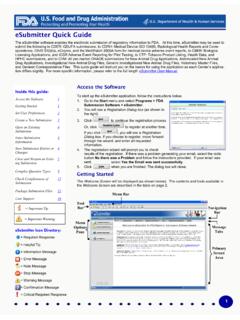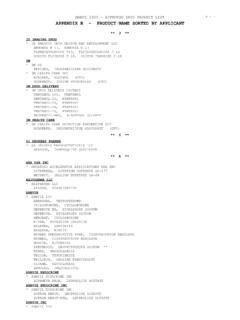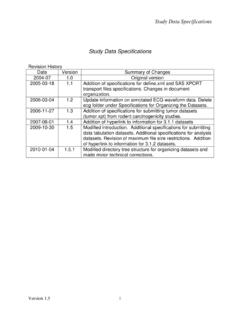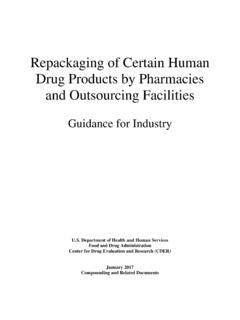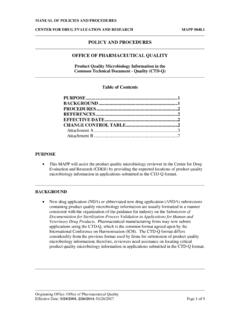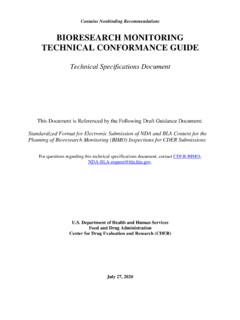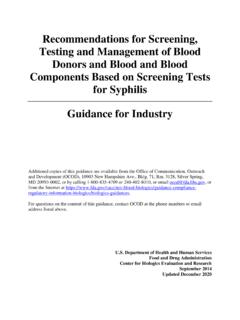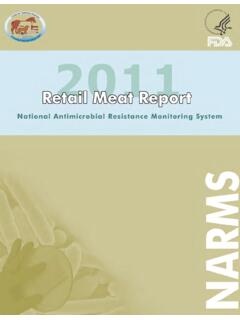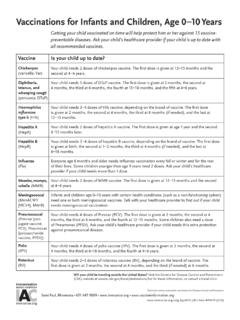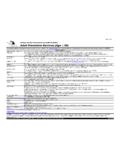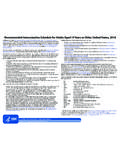Transcription of For Older Adults
1 food SAFETYFor Older Adults and People with Cancer, Diabetes, HIV/AIDS, Organ Transplants, and Autoimmune DiseasesJuly Older Adult s Foodborne Illness StoryDiana was 64 years old and in fairly good health, but her age made her vulnerable to foodborne illness. This is her true story. My youngest daughter had been ill, and she was in the hospital. So, I was in a hurry to get something to eat for dinner because it was late in the evening. I ran to the grocery store and picked up some ground turkey and I cooked about half of it as a burger and ate it. I put the other half in the woke up with a really, really upset stomach. That s when my problem with diarrhea started, and by the next day, it was constant. I thought it was just a case of the flu and it had gotten son came to see me and said, Mom, you just sound terrible, and he took me to urgent care. The medical staff checked me, and my potassium was You re supposed to die when your potassium is as low as , so the urgent care center called an ambulance and immediately transported me to the main hospital.
2 Diana was suffering from salmonella poisoning and struggled with constant diarrhea and dehydration. I was going continually because the diarrhea was nonstop. Nearly every hour, a nurse would put another IV bag up because I was losing so much fluid so rapidly. That s how I got severely dehydrated, because fluid was going out faster than they could put it in. A couple of times the doctor thought I was going to die. I couldn t lift my head off the pillow. I was so sick, and I m just lucky I lived through it. I look back at getting food poisoning because I had my grandson with me that day. He was little then and was a picky eater that s the only reason he didn t eat any of the ground turkey. Just think how serious it would have been if my grandson had eaten the turkey burger and gotten sick too!" patients safe from foodborne illness is fundamental to federal, state, and local health agencies.
3 Having a sample of the contaminated food allowed inspectors to trace the food back to its source and find out how it had been contaminated."Salmonella s effect on my body was unbelievable. Usually, salmonella poisoning goes away on its own without medical treatment. But, since I was Older , I ended up with a severe case of foodborne illness that I had to be hospitalized for. A woman from the health department called me after I d gone home from the hospital and told me it was salmonella poisoning. I still had the other half of the ground turkey in the freezer. The health department asked if they could send a staff member to my house to get the turkey and I said yes. So, I was able to give the health department a sample to analyze and confirm that the turkey was contaminated with salmonella. The immune system tends to get weaker as people age, which increases the risk of getting a foodborne infection that can result in a serious illness requiring hospitalization or even causing of ContentsFood safety for Older Adults and People with Cancer, Diabetes, HIV/AIDS, Organ Transplants, and Autoimmune Diseases 1 The Immune System: Its Importance 1 food safety .
4 Why It s Critical for People with a Weakened Immune System 1 Older Adults 1 People with Cancer 2 People with Diabetes 2 People with HIV/AIDS 2 People with Organ Transplants 2 People with Autoimmune Diseases 2 Eating at Home: Making Wise food Choices 3 Taking Care: Handling and Preparing food for People with Immune Systems Weakened by Age, Illness, or Medication 5In the Know: Safe Shopping 8 Tips: Transporting food to a Picnic or a Party 10 Being Smart When Eating Out 10 Stay Safe.
5 Traveling Internationally 11 Foodborne Illness: Know the Symptoms 11 More Information from food and drug administration 12 Additional food safety Information 13 Notes 14 Four Steps to food safety safety for Older Adults and People with Cancer, Diabetes, HIV/AIDS, Organ Transplants.
6 And Autoimmune DiseasesFood safety is important for everyone but it s extremely important for individuals with a weakened immune system, which makes them especially vulnerable to foodborne illness. This guide is intended to help old-er Adults and people with cancer, diabetes, HIV/AIDS, organ transplants, or autoimmune diseases avoid foodborne addition to the information in this booklet, talk with your health care provider about any foods or other products to avoid because of any special health needs you may Immune System: Its ImportanceYour immune system is vital for your health because it defends your body against infectious organ-isms and other invaders. Spread throughout your body, the immune system is made up of a network of cells, tissues, and organs that work together to protect you. When your immune system senses disease-causing organisms and other substances that invade the body, it responds to fight them people get Older , their immune systems decline.
7 Diseases such as cancer and diabetes can weaken the immune system. Also, medications for HIV/AIDS, organ transplants, and autoimmune diseases, like rheumatoid arthritis and lupus, weaken the immune safety : Why It s Critical for People with a Weakened Immune SystemWhen disease-causing bacteria, viruses, or parasites (germs) contaminate food , they can cause foodborne illness, often called food poisoning. While the food supply in the United States is among the safest in the world, it can still be a source of to the Centers for Disease Control and Prevention, 48 million persons or 1 of every 6 people get foodborne infections each year . Of those, 128,000 are hospitalized, and 3,000 die from their foodborne illness. People who have a weakened immune system have a higher risk for food poisoning. People with weakened immune systems are more likely to have a lengthier illness, under-go hospitalization, or even die as a result of foodborne Adults People 65 and Older are at a higher risk for hospitalization and death from foodborne illness.
8 This increased risk is because organs and body systems change as the body digestive system holds food longer, allowing bacteria to grow while the stomach may not produce enough acid to limit the number of intestinal bacteria. The liver and kidneys may not properly rid the body of foreign bacteria and 50 and 60, the immune system in most people begins to decline. After age 75, many Adults have an immune system so weakened that their risk for contracting a food -borne illness increases while the ability of their bodies to fight the infection is with Cancer If it spreads into the bone marrow, cancer can weaken the immune system. Also, most cancer patients undergo therapy such as radia-tion, chemotherapy, and/or medications to help fight the disease. A side effect of these treatments is that they may weak-en the immune system, making patients more vulnerable to infections like food -borne illnesses.
9 People with Diabetes The immune systems of the millions of people with diabetes in the United States may not readily recognize the bacteria and viruses that cause food poisoning. This delayed response places a person with diabetes at increased risk for infection. Also, diabetes may damage the cells that create stomach acid and the nerves that help the stomach and intestines move food through the normal digestive process. As result, the digestive tract may hold on to food for a longer time, allowing harmful bacteria and viruses to multiply. In addition, diabetes may cause the kidneys, which work to cleanse the body, to hold on to harmful bacteria, toxins, and other with HIV/AIDS When the Human Immunodeficiency Virus/Acquired Immunodeficien-cy Syndrome (HIV/AIDS) damages or destroys the immune system, individuals become more vulnerable to developing an infection, including a foodborne with Organ Transplants A healthy immune system will try to reject or destroy an organ or bone marrow transplant in the same way that the immune system works to clear infection from the body.
10 Therefore, transplant recipients commonly take medications to keep rejection from happening. These drugs are called immunosuppressants because they suppress a person s immune system to keep it from attacking, or rejecting transplanted organs or bone marrow. A side effect of immunosuppressants is that they leave patients more susceptible to developing infections like those that can be brought on by the bacteria and viruses that cause foodborne with Autoimmune Diseases Autoimmune diseases, such as multiple sclerosis, inflammatory bowel disease, and lupus are conditions in which the immune system mistakenly attacks the body. People with autoimmune diseases are often treated with immunosuppres-sants, and they are more likely to get a foodborne illness because their immune systems can t fight infection effectively. good news is that taking steps to select and prepare foods safely can often help people avoid foodborne at Home: Making Wise food ChoicesSome foods are riskier than others.
